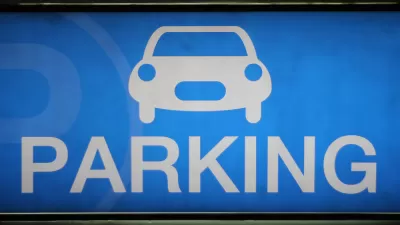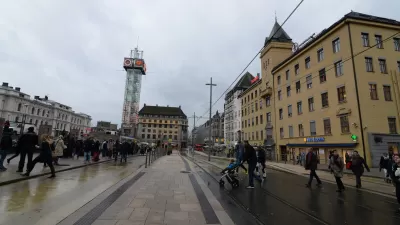After failing to implement a car ban, Oslo officials are converting downtown street parking into public space.

Oslo officials made ambitious goals to cut the city's emissions by 95 percent by 2030, then a downtown car ban failed to pass. Still, officials didn't give up on cutting the significant portion of emissions that comes from private cars. "Instead of an outright car ban, Oslo has now announced a tactical-urbanism approach to limiting vehicle movement through the city center by simply removing all the parking spots from the area," Eillie Anzilotti reports for Fast Company.
The onstreet parking the city is reclaiming will be put to use in other means. "Some will be playgrounds or cultural events, or [contain] benches or bike parking—or other things you can fill the space with when you don’t have 1,200 kilograms of glass and steel," Oslo vice mayor for environment and transport Lan Marie Nguyen Berg recently said on the record for a separate article for The Guardian.
"Those plans are spelled out in more detail in the city’s outline for six pilot spaces, which include ideas for a beer garden and an 'outdoor living area' featuring different pieces of street furniture and an e-bench with wifi and charging capabilities," Anzilotti writes.
Officials hope that business and residents will benefit from the more walk-centric streets and become more enthusiastic about the move. If they don't, these changes are unlikely to stick and it will be hard for the city to hit its emission's goals.
FULL STORY: If You Can’t Ban Cars Downtown, Just Take Away The Parking Spaces

Study: Maui’s Plan to Convert Vacation Rentals to Long-Term Housing Could Cause Nearly $1 Billion Economic Loss
The plan would reduce visitor accommodation by 25,% resulting in 1,900 jobs lost.

North Texas Transit Leaders Tout Benefits of TOD for Growing Region
At a summit focused on transit-oriented development, policymakers discussed how North Texas’ expanded light rail system can serve as a tool for economic growth.

Why Should We Subsidize Public Transportation?
Many public transit agencies face financial stress due to rising costs, declining fare revenue, and declining subsidies. Transit advocates must provide a strong business case for increasing public transit funding.

Columbia’s Revitalized ‘Loop’ Is a Hub for Local Entrepreneurs
A focus on small businesses is helping a commercial corridor in Columbia, Missouri thrive.

Invasive Insect Threatens Minnesota’s Ash Forests
The Emerald Ash Borer is a rapidly spreading invasive pest threatening Minnesota’s ash trees, and homeowners are encouraged to plant diverse replacement species, avoid moving ash firewood, and monitor for signs of infestation.

Agreement Keeps NYC Congestion Pricing Alive Through Summer
The tolling program will continue while a court considers the city’s lawsuit against the Trump administration.
Urban Design for Planners 1: Software Tools
This six-course series explores essential urban design concepts using open source software and equips planners with the tools they need to participate fully in the urban design process.
Planning for Universal Design
Learn the tools for implementing Universal Design in planning regulations.
Ascent Environmental
Borough of Carlisle
Institute for Housing and Urban Development Studies (IHS)
City of Grandview
Harvard GSD Executive Education
Toledo-Lucas County Plan Commissions
Salt Lake City
NYU Wagner Graduate School of Public Service





























